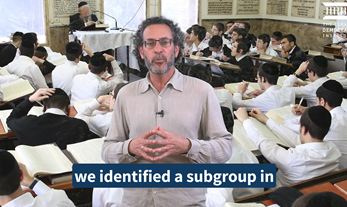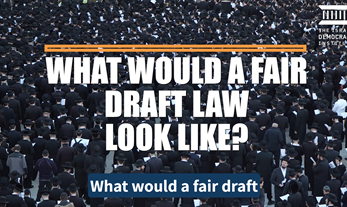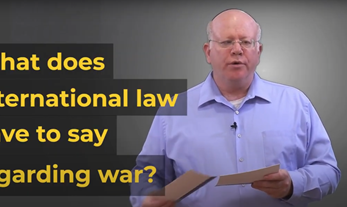


Stanford CDDRL Israel Insights Webinar with Karnit Flug — The Israeli Economy: Quo Vadis?
Written By: Prof. Karnit Flug
Professor Karnit Flug, former Governor of the Bank of Israel from 2013 to 2018, and William Davidson Senior Fellow for Economic Policy at IDI's Center for Governance and the Economy, joined Amichai Magen, a Senior Research Scholar at Stanford's Center on Democracy, Development and the Rule of Law (CDDRL) and the founding director of the center's Jan Koum Israel Studies Program. After two years of war and growing international challenges, where is the Israeli economy now, and where might it be going?

IDI President Yohanan Plesner on the 2026 Israeli Elections
Written By: Yohanan Plesner
Israel is entering a pivotal election year—its first since the judicial overhaul and the war that began on October 7, 2023. Throughout the year, IDI is asking its experts which issues will shape the election campaign. IDI President Yohanan Plesner is watching three key areas: national security, including efforts to advance regional stability and examine the failures surrounding October 7; ultra-Orthodox conscription, given the IDF’s manpower needs and the post-war reality; and Israel’s democratic character, as questions surrounding the rule of law and checks and balances return to the center of the public agenda.

Eric Goldstein CEO of UJA-Federation of NY with IDI's Yohanan Plesner and Shlomit Ravitsky Tur-Paz
Written By: Yohanan Plesner , Adv. Shlomit Ravitsky Tur-Paz
Eric Goldstein, CEO of UJA-Federation of New York, joined Yohanan Plesner, President of the Israel Democracy Institute, and Shlomit Ravitsky Tur-Paz, Director of IDI’s Joan and Irwin Jacobs Center for Shared Society, for an online conversation on “The Fifth Tribe,” the challenges facing American Jewry, and the relationship between Israel and the Jewish diaspora during the war and beyond.

Reuven Rivlin with Prof. Suzie Navot at the Annual Shared Society Conference 2025
Written By: Prof. Suzie Navot
Former President Reuven Rivlin, IDI's Honorary Chair and Joan and Irwin Jacobs Distinguished Fellow, joined IDI's Vice President for Research Prof. Suzie Navot at the annual Shared Society Conference for a conversation on political polarization, the urgent need for genuine constitutional reform, and what it truly means to uphold the principles of a democratic and Jewish state.

The Danger of a Politicized Judicial Selection Committee
Dr. Guy Lurie, a Research Fellow at IDI's Democratic Values and Institutions Program, offers a breakdown on the risks of politicization inherent in the recent proposal by Minister of Justice Levin and Foreign Minister Sa'ar to reform the Judicial Selection Committee.

What Happens When Israel’s Minister of Justice Refuses to Cooperate with the Chief Justice?
IDI's Dr. Guy Lurie explains the far-reaching implications of non-cooperation between the two leaders of Israel's judiciary.
"It's the everyday citizens who are sure to pay the price."

IDI Releases New Survey Findings on Haredim; Convenes Haredi & Arab Leaders to Advance Shared Society
Written By: Israel Democracy Institute
The Israel Democracy Institute’s Joan and Irwin Jacobs Center for Shared Society convened its annual conference to discuss key issues of shared society.

ICC Arrest Warrants against Israeli Leaders - Legal and Practical Implications
IDI's Prof. Yuval Shany and Prof. Irwin Cotler discuss the ICC arrest warrants issued against Israel's Prime Minister and former Defense Minister. The event was hosted by the International Jewish Lawyers organization in partnership with the American Association of Jewish Lawyers and Jurists (AAJLJ).

Yohanan Plesner | CNN Newsroom | Israel-Hezbollah Ceasefire Begins
Yohanan Plesner, President of IDI, spoke with CNN's Max Foster as a ceasefire agreement came into force earlier this morning.

Yohanan Plesner | BBC News | Israeli Public Opinion on Negotiations with Hamas
Yohanan Plesner, president of IDI, spoke with BBC News' Ben Brown as wide-scale protests erupted in Israel following the harrowing murder of six Israeli hostages by

IDF - Ultra-Orthodox Conscription - What Happens Next?

Supreme Court Ruling on Haredi Draft | Yohanan Plesner on BBC News
"Basically we've entered into a new unknown terrain," says IDI President Yohanan Plesner.

Ultra-Orthodox Conscription | Supreme Court Ruling | Yohanan Plesner on CNN
"It's a matter of a change in the trajectory," says Yohanan Plesner, president of IDI following the Israeli Supreme Court ruling on the issue of ultra-Orthodox conscription.

Principles for a Fair Draft Law
Yohanan Plesner, President of IDI lays out the basic principles for a fair draft law.

The Economic Impact of Haredi (non) Enlistment
What are the economic impacts of the Haredi blanket exemption and how would drafting the ultra-Orthodox benefit Israeli society and economy?

IDI Hurvitz Conference: More must be done to meet the moment, economically and militarily
Press Release
Eli Hurvitz Conference: Morning Sessions

IDI Hurvitz Conference (cont.): Security and stability in an equal burden of IDF service & efficient civil service sector
Press Release
Eli Hurvitz Conference: Afternoon Sessions

The Effects of ICC Warrants on Israel
IDI's Prof. Amichai Cohen, an expert in international law, explains the repercussions that ICC warrants may have on Israel. Should these warrants be issued, 120 countries would be obligated to execute them. They could severely damage Israel's international image, impacting Israeli officials as well as economic and cultural cooperation

Timeline: The Ultra-Orthodox and the IDF Draft
When did the ultra-Orthodox first receive an exemption from military service? How have Haredi demographics influenced this issue?
This is a timeline of the central milestones affecting the issue of Haredi conscription.

Economic Implications of Drafting Ultra-Orthodox in Israel
In new research, IDI experts Shlomit Ravitsky Tur-Paz and Gabi Gordon find that conscripting even a small percentage of eligible Haredi men would save the Israeli economy billions of shekels annually. They found that drafting even 20% of Haredi men would significantly reduce the number of days necessary for reserve duty and save 2.5 billion shekels in budgetary expenses by 2050. Full conscription of the ultra-Orthodox men would eliminate the need for reserve duty by 2045 and save the Israeli economy between 8-10 billion shekels.

A Majority of Jewish Israelis See a Hostage Deal as a Higher National Priority Than Military Action in Rafah
Written By: Prof. Tamar Hermann, Dr. Lior Yohanani, Yaron Kaplan
A new survey by the Israel Democracy Institute's Viterbi Center for Public Opinion examined what should be the highest priority in terms of Israeli national interest: military action in Rafah or a deal to release the hostages held by Hamas.

Alternative Yeshivas and Changing Perspectives Among Haredi Youth
Dr. Asaf Malchi's research explores the perspective of yeshiva students, their personal and social challenges and highlights a subgroup of 'alterative yeshivas' and their shifting perspectives on vocational training and employment.

A Fair Draft Law, What Would That Look Like?
IDI's Dr. Gilad Malach explains what a fair draft law for the ultra-Orthodox would look like. One that would distribute the burden over Israel's security more equally while enabling young Haredi men to integrate into the job market.

JFNA & IDI Webinar on Israel’s Economy with Prof. Karnit Flug and Bloomberg News’ Galit Altstein
IDI's Prof. Karnit Flug, VP of Research and the William Davidson Senior Fellow for Economic Policy joined Jeff Schoenfeld, Chair of the Jewish Federation's Israel and Overseas Committee and Bloomberg's Galit Altstein to discuss the implications of the ongoing war in Gaza on Israel's economy.

International Law and the War in Gaza
Written By: Prof. Amichai Cohen
IDI's Prof. Amichai Cohen answers a series of questions on international law and its dealings with the laws of war.





